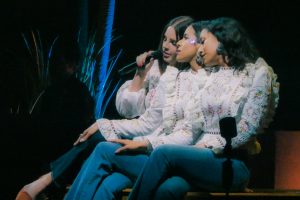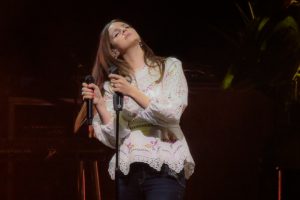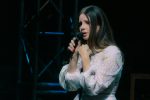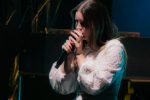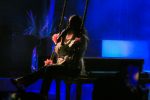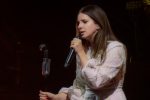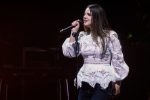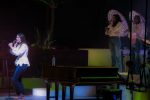REVIEW: Lana Del Rey provides music history lesson at the Greek Theatre
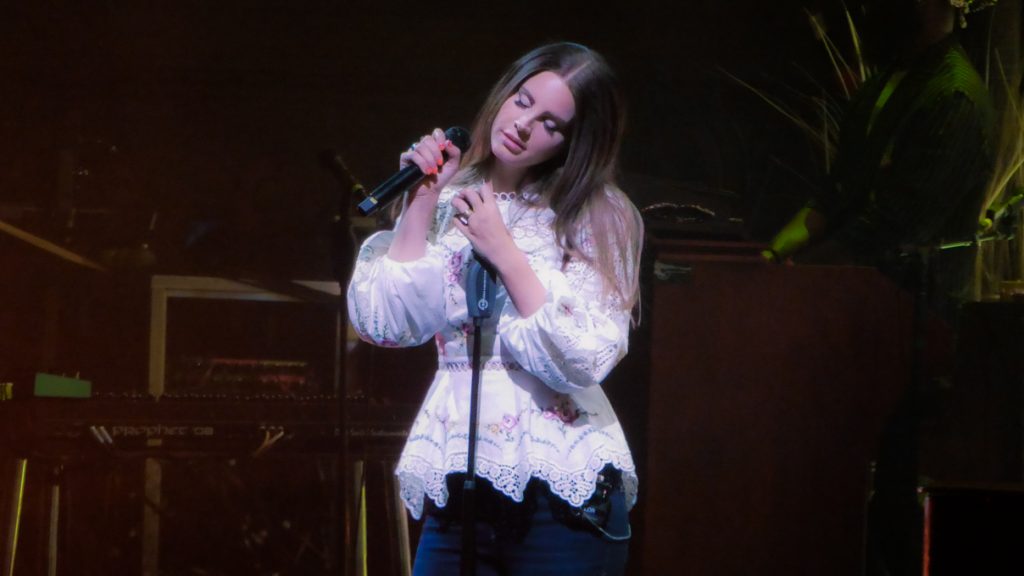
Lana Del Rey performs at the Hearst Greek Theatre in Berkeley on Oct. 6, 2019. Photos: Roman Gokhman.
BERKELEY — In what is likely to be known as the show of the 2019 season at the Hearst Greek Theatre, in terms of attendance, Lana Del Rey delivered even more than what fans expected of her. The melodramatic singer-songwriter’s performance was full of organic, sometimes off-the-cuff moments in which all pretense and perception falls away.
And then, two songs in, Joan Baez showed up, and in between two songs told a story that addressed the image of Lana Del Rey that non-fans may hold, as an aloof performer and a disengaged person in a celebrity-driven culture. Baez said that her granddaughter, who’s never impressed by her connections, sat in on a dinner with the headliner a night or two earlier.
“She said about Lana, ‘Gosh, she’s so nice. She’s so down to earth. She’s a real person,'” Baez said.
From the moment one approached the Greek, the night felt different. More traffic in the area, hundreds streaming into the theater more than an hour after doors first opened. Inside, groups of people walked in circles, unable to find any seats. The grass lawn was packed as well. Chants of “Lana! Lana! Lana!” circulated a good hour before she even took the stage.
The stage was festooned with greenery: palm trees here, other trees there. Sheets of (likely plastic) vines hung from the top of the stage. The stage had a grand piano, on top of which two of Lana Del Rey’s entourage lounged at the start of the show. They provided some dance moves, a la ’60s lounge-set films. A keyboardist stationed kitty-corner from the piano served the role of bandleader. Between most songs, Lana Del Rey would approach him, they’d exchange a few words, and he would initiate the next song. It seemed as though there was no set order of songs, and she and her band picked them one at a time.
Most of the show maintained Lana Del Rey’s signature downbeat, conversational sound. There were no grand solos or Everest-climbing falsettos. But if you think that would make for an uninteresting show, you’d be wrong. She began with “Norman Fucking Rockwell,” the title track off her new album. After singing the first verse in the middle of the stage, she began to wander around to fans, reading signs and waving back to them. By the end of the song, she was on top of the piano with her friends, who continued to canoodle into the next song, piano ballad “Bartender.” Lana Del Rey enunciated each word methodically.
Following a cover of Joni Mitchell’s “For Free,” she invited special guest Joan Baez to the stage to play the elder’s “Diamonds and Rust,” with Baez on guitar.
“Hello, children,” Baez said by way of a greeting. Judging by the lack of loud applause (it was incredibly loud most of the way through), many didn’t know exactly who Baez was, but it was clear that her guitar-playing ability was appreciated. After the song Baez handed over her guitar to a stagehand, hugged Lana Del Rey and looked like she was about to exit stage left. But the headliner was not done. Some more words were exchanged, the guitar was summoned back, and Baez got to play a song of her choice, the terrific, “Don’t Think Twice, It’s All Right” by her former flame Bob Dylan.
The moment lasted about 10 minutes, but its unplanned, organic nature was enough to make an impression. It not only showed appreciation to those who came earlier (including Joni Mitchell), but some character.
On the following “Mariners Apartment Complex,” the rest of her band got to rev its engine for the first time. The only time the tempo increased to faster than that came two songs later into the show, on “Blue Jeans.” That song felt almost orchestral, though there was no orchestra on stage. Lana Del Rey went into the pit in front of the first row toward the end.
“Can I have my vape if I promise not to lose it?” she asked prior to “Born to Die,” which she performed from a circular platform at the back of the stage. During the fan favorite, the roar of the crowd reached a zenith and almost didn’t seem real. People were singing along so loudly that it felt like a mic’d church choir was on stage. But as loud as fans got, they were equally silent and attentive during the quietest moments, of which there were plenty. These were really polite fans.
Lana Del Rey trusted them enough to offer the front row a song request. And even though she didn’t have new song “California” fully memorized, she obliged and sang a verse a cappella. Following “Cherry,” “White Mustang” and “Scarborough Fair,” a folk standard popularized by Simon & Garfunkel, she got to the touching song, “Pretty When You Cry.” Singing with her back on the stage floor, she looked like one might expect her to in her own room. The song had a somewhat doo-wop vibe until her band kicked in.
A medley of several songs, including “Change” and “Young and Beautiful,” came with a shower of glitter that flittered above the stage before dissipating. “Will you still love me if I’m no longer beautiful?” Lana Del Rey sang in a half-vibrato.
The following “Ride,” “Video Games” and “Ultraviolence” went over really well with the crowd, after which Lana Del Rey invited another friend on stage. This time it was legend Leonard Cohen’s son, songwriter Adam Cohen. The two performed his father’s “Chelsea Hotel” together. When he complimented her and offered to watch her sing the song alone, she cut him off, said she’d have none of that and told him to play his guitar.
Other highlights came on “Summertime Sadness,” and her cover of Sublime’s “Doin’ Time,” with waves of emotion from both songs.
She concluded with the crunchy guitar-led “Off to the Races” and “Venice Bitch.”
- Lana Del Rey performs at the Hearst Greek Theatre in Berkeley on Oct. 6, 2019.
- Lana Del Rey performs at the Hearst Greek Theatre in Berkeley on Oct. 6, 2019.
- Lana Del Rey performs at the Hearst Greek Theatre in Berkeley on Oct. 6, 2019.
- Lana Del Rey performs at the Hearst Greek Theatre in Berkeley on Oct. 6, 2019.
- Lana Del Rey performs at the Hearst Greek Theatre in Berkeley on Oct. 6, 2019.
- Lana Del Rey performs at the Hearst Greek Theatre in Berkeley on Oct. 6, 2019.
Follow editor Roman Gokhman at Twitter.com/RomiTheWriter.

